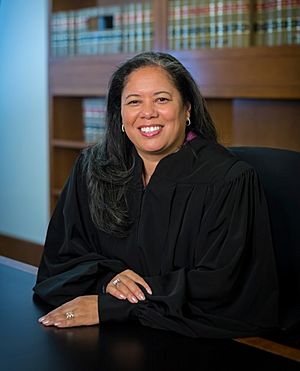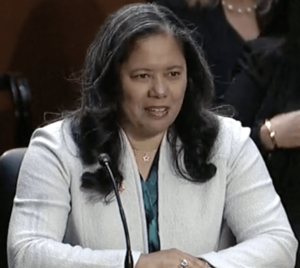Angel Kelley facts for kids
Quick facts for kids
Angel Kelley
|
|
|---|---|

Kelley in 2021
|
|
| Judge of the United States District Court for the District of Massachusetts | |
| Assumed office September 15, 2021 |
|
| Appointed by | Joe Biden |
| Preceded by | Douglas P. Woodlock |
| Judge of the Massachusetts Superior Court | |
| In office 2013 – September 15, 2021 |
|
| Appointed by | Charlie Baker |
| Judge of the Brockton District Court | |
| In office 2009–2013 |
|
| Appointed by | Deval Patrick |
| Personal details | |
| Born | 1967 (age 58–59) New Rochelle, New York, U.S. |
| Education | Colgate University (BA) Georgetown University (JD) Temple University (LLM) |
Angel Kelley, born in 1967, is an American lawyer and judge. She currently serves as a federal judge in the United States District Court for the District of Massachusetts. Before this important role, she was a judge in the Massachusetts Superior Court.
Contents
Early Life and Education
Angel Kelley was born in New Rochelle, New York, in 1967. She studied at Colgate University, where she earned her first degree in 1989. She then went to Georgetown University and became a lawyer in 1992. Later, she continued her studies at Temple University, earning an advanced law degree in 2003.
Legal Career and Teaching
Kelley started her legal career helping young people at The Legal Aid Society in Brooklyn, New York, from 1993 to 1997. After that, she worked as a lawyer for the Port Authority of New York and New Jersey until 2005.
From 2007 to 2009, she worked as an Assistant United States Attorney. This means she was a lawyer for the U.S. government in Massachusetts.
Besides her work as a lawyer, Angel Kelley also taught law. She was an instructor at Columbia University and New York University. She also taught at Harvard Law School. Since 2012, she has been a professor at Suffolk University Law School. She has also taught at Emory University School of Law and Boston University School of Law.
Becoming a Judge
State Judge Service
In 2009, Angel Kelley became a judge for the first time. She was appointed to the Brockton District Court by Governor Deval Patrick. She officially started her role on September 17, 2010.
A few years later, in 2013, she was chosen to be a judge for the Massachusetts Superior Court. This is a higher court in the state. She was confirmed for this position on January 24, 2013.
Federal Judge Service
On May 12, 2021, President Joe Biden nominated Angel Kelley to become a federal judge. This is a very important job, as federal judges handle cases that involve U.S. laws. She was nominated for a position in the United States District Court for the District of Massachusetts.
Her nomination was reviewed by the United States Senate Committee on the Judiciary. On September 14, 2021, the United States Senate voted to confirm her. She officially became a federal judge on September 15, 2021.
Judge Kelley is a significant figure in the legal world. She is the second African American female judge and the second Asian American judge to serve on the U.S. District Court in Massachusetts.
Important Decisions
Judge Kelley has made important rulings in her role. For example, in February 2025, she made a decision about how the NIH (National Institutes of Health) would fund research grants. The NIH had planned to limit the money given to universities for their research costs.
However, Judge Kelley issued an order that stopped this new rule from taking effect. She later expanded her ruling to cover universities across the entire country. On March 5, 2025, she issued a preliminary order that blocked the funding limit indefinitely while the case continued.
Then, on April 4, 2025, Judge Kelley made her decision permanent. She permanently stopped the government from limiting the funding for research at universities and medical centers. This decision restored billions of dollars in grant money and was one of the first major rulings against the Trump administration's policies at that time.
See also
- List of African-American federal judges
- List of African-American jurists
- List of Asian American jurists
 | Misty Copeland |
 | Raven Wilkinson |
 | Debra Austin |
 | Aesha Ash |


